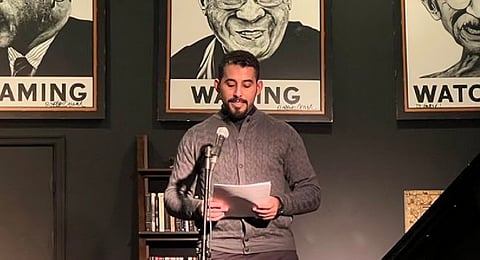

Palestinian poet Mosab Abu Toha, who has faced deportation threats from pro-Israeli groups in the US, has been awarded the Pulitzer Prize for Commentary.
The award, that was announced on Monday, honours his four moving essays published in The New Yorker, which combine deep reporting with personal insight to convey the human cost of Israel's genocidal war on Gaza. Through his writing, Abu Toha offers a moving and powerful account of the Palestinian experience.
The four essays – The Pain of Travelling While Palestinian, The Gaza We Leave Behind, Requiem for a Refugee Camp, and My Family’s Daily Struggle to Find Food in Gaza – published over the past two years, address a range of themes, from the challenges of leaving Gaza to the destruction caused by the genocidal war, and the daily struggle to survive under siege.
In one essay, Abu Toha describes the struggles of life in present day Gaza, where each day is consumed by the desperate search for food, clean water, and safety amid relentless bombardment. In Requiem for a Refugee Camp, he reflects on Jabalia Camp, the largest refugee camp in Palestine, which houses over 100,000 people.
Taking to social media to share the news, Abu Toha tweeted, “I have just won a Pulitzer Prize for Commentary.”
Borrowing the words of his fellow Palestinian poet Refaat Alareer, he wrote: “Let it bring hope. Let it be a tale.”
If I Must Die, let it be a tale was written by Alareer just before he was killed in an Israeli airstrike on Gaza in December 2023.
“I’m honoured to receive the Pulitzer Prize today. Great thanks to the prize’s jury and board members for honouring me,” Abu Toha wrote, dedicating the award to his family, friends, teachers, and students in Gaza.
He ended the tweet with a prayer: “I’m praying for an immediate and permanent ceasefire and JUSTICE and PEACE!”
He also offered blessings to all those who have lost their lives in the violence and destruction brought on by Israel in the ongoing war.
Since January 28, Betar US, a Zionist activist group, has targeted Abu Toha on social media, even calling for his deportation.
Born in 1992 in a refugee camp in Gaza City, Abu Toha's life has been defined by war, displacement, and the resilience required to survive under siege.
At the age of 16, Mosab Abu Toha was injured in an Israeli airstrike that killed six people, deeply influencing his poetry, including his piece “The Wounds.”
He also founded the Edward Said Library, the first English language library in the region which was later destroyed in an Israeli airstrike. He completed his BA in English and taught in Gaza for a while. Abu Toha left Gaza for the first time in 2019 to attend a prestigious fellowship at Harvard University. He later earned his MFA from Syracuse University in 2023.
On October 13, 2023, Abu Toha lost 31 members of his family in an Israeli strike targeting their family home. His own house was destroyed in another strike later that month. He subsequently evacuated from Gaza and moved to the US.
He identifies as “a Palestinian refugee chronicling his people’s lives under siege and war, but also their struggle for justice and dignity.”
Other finalists in the Pulitzer Prize commentary category included Gustavo Arellano of the Los Angeles Times and Jerry Brewer of The Washington Post.